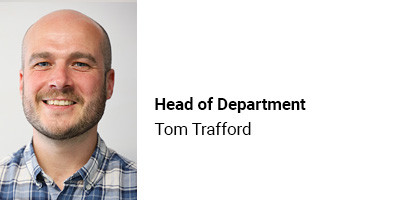Philosophy A Level
Qualification: GCE A Level in Philosophy
Exam Board & Specification Code: AQA; 7172; Specification
Course Entry Requirements: 6 in English Language GCSE or 6 in English Literature GCSE. We advise against studying Philosophy and RS together. If you wish to do so then we will discuss this with you during the application and enrolment process.
Please make sure that you have understood the overall entry requirements to study at BHASVIC. These are available here and outline the GCSE grades you need to take up one of the Study Programmes at the college.
Length and size of qualification: 2 year single course
Timetable hours: 4.5 hours per week
Assessment method: 2 x 3 hour exams
BHASVIC Department: Philosophy, Politics and Law
What will I study?
The A Level Philosophy course is taught in a thematic way, covering four themes:
- Epistemology
- Ethics (or Moral philosophy)
- Philosophy of Mind (or metaphysics of mind)
- Philosophy of Religion (or ‘metaphysics of God’)
In first year, we start with Epistemology (the study of knowledge) where you will explore topics such as where knowledge comes from and whether we can trust what our senses tell us about the world. The next theme, Ethics, looks into morality and considers a range of different ethical approaches including theories like utilitarianism and deontological ethics as well as applied ethics issues such as eating animals and killing in computer games.
In second year we start Philosophy of Mind which explores the nature of the mind and whether consciousness is something non-physical (like a soul) or instead explainable in purely physical terms. Finally, Philosophy of Religion covers arguments for and against the existence of God as well as questions around the problem of evil and God’s attributes.
Within each of the four philosophical themes studied, you will have a chance to engage with the works of key philosophers who have theories and arguments related to those areas, from the Ancient Greek philosophers Aristotle and Plato, to more modern thinkers like Rene Descartes, John Locke, David Hume and Immanuel Kant, all the way to modern thinkers such as Bertrand Russell, AJ Ayer and Daniel Dennett. The Philosophy A Level is a Western Philosophy course but that’s not to say that points about other world philosophies won’t come up in discussions in classes just that the focus in the course material and what you are examined on is very much Western-focused. The Philosophy A Level will help you to understand the evolution of ideas in Western Philosophy and how differing schools of thought and perspectives emerge over time.
Is this course right for me?
Philosophy is a great course for those who want to explore issues in depth and are not afraid to explore ideas and theories that may seem abstract or difficult to grasp at first. While we look at some of the big questions, we also look at many of the ideas that other subjects skip over, like how can you be sure that what you observe in science is real? It is also important that students who study the subject are open to examining theories and ideas that may be different from their own. It’s also crucial that students can think clearly, precisely and with the careful use of logic. This is because we are not looking for people’s opinions or outlandish theories but their arguments built on evidence and argument.
Students often find philosophy very challenging at first and it can be a bit of a shock when they start while being a stimulating subject, it is also a demanding one. But over time students develop the skills to evaluate their own answers and formulate responses. You will learn how to build an argument and to spot logical flaws whilst thinking critically, meaning debate and discussion are key in lessons as a method used to achieve this. There will also be some reading of original texts in philosophy to gain precise understandings of thinker’s ideas.
Where next?
A Level Philosophy students go on to pursue a wide range of careers. The skills developed on the course are useful for the charity sector, environmental work, government careers, policy work, business strategy and management as well as emerging roles in AI (artificial intelligence) and medicine, especially with how these roles may intersect with ethics. Often philosophy is the perfect degree to have for the challenging job that has no specific subject requirement.
Many of our students go on to study philosophy at university and the course sets them up really well for this. For other subject and career routes, Philosophy provides a range of transferrable skills, including: logical and analytical thinking and reasoning, problem solving, written and oral communication, ability to interpret, condense and clarify information, ability to formulate your own opinions and defend them in debate and the ability to interpret and analyse a variety of different information. Useful websites to research careers and wider progression options could include Prospects, All About Careers and The Apprenticeship Guide.
ApplyLast year, 29 BHASVIC students went onto study Philosophy-related degrees at 13 different universities.
Philosophy is often combined with other studies at degree level resulting in a broad, interesting area of study such as Philosophy, Politics and Economics (PPE).
Popular universities included Bristol, Manchester and Nottingham and students went onto study Philosophy at both Oxford and Cambridge.
Should I study Philosophy at degree level?
A philosophy degree involves studying the ideas of great thinkers, examining their arguments and voicing your own opinions - and it could be a good fit if you're the sort of person who continually questions things & likes an intellectual challenge. Studying philosophy leads to around six hours of lectures a week and six hours of tutorials every other week. In your first year your course may cover a range of topics, from ethics to knowledge to logic.
Types of Philosophy degree
You can choose to study Philosophy or closely related subjects, for example Politics, Philosophy and Economics. Philosophy combines well with a variety of subjects for example.
- Maths
- English
Entry Requirements
A-levels (or equivalent) usually required
- No Specific Requirements
Useful to have
- English
- Mathematics
- Religious studies
- Classics
- Philosophy
Top Universities for Philosophy
Oxford, Cambridge, St Andrews, LSE, UCL, Durham
Lancaster, York, Essex, Kent – all very high student satisfaction scores
Birmingham, Sussex, Sheffield - all with top graduate prospects
Many of our students choose a combined degree - applications from our students have included:
- Human, Social, and Political Sciences
- Philosophy, Politics and Economics
- Ancient History and Philosophy
- English and Philosophy
Example entry requirements:
A-Level/BTEC equivalents (please check):
- Lancaster Philosophy A,B,B
- Sussex Philosophy B,B,B-A,B,B
- Nottingham Philosophy A,A,B
Why not try a foundation degree or higher apprenticeship?
Royal Holloway Philosophy (Foundation) C,C,C
Some examples of Philosophy-related degrees that our BHASVIC students have gone onto study in the past few years are:
- Ancient History and Philosophy
- Classical Studies and Philosophy
- Economics and Philosophy
- English/Philosophy (Equal)
- Human, Social, and Political Sciences
- Philosophy and Management
- Philosophy and Modern Languages
- Philosophy and Politics
- Philosophy and Theology
- Philosophy, Politics and Economics
- Philosophy, Politics and Economics with a Year in Industry
- Philosophy, Psychology and Scientific Thought
- Philosophy, Business and Ethics
- Theology, Religion, and Philosophy of Religion
- World Philosophies
How BHASVIC helps: We have a wide range of information and resources to support students applying for university including subject area guides, personal statement and UCAS resources, super-curricular activity guides, open day and bursary information. We also cover university research, careers, art foundation and all other destinations in depth in tutorial and students can choose an appropriate pathway for them in the second year from UCAS, Employability & Enterprise, Visual Arts, Oxbridge and Medics. Our Spring Futures Fair brings in a huge number of university visitors with workshops and information stands and departments will bring speakers in wherever possible.
Philosophy teaches you how to think for yourself and how to analyse and communicate ideas clearly and logically:
- Health service manager
- Newspaper journalist
- Psychotherapist
- Recruitment consultant
- Solicitor
Career Prospects
Although there aren't a lot of jobs around for professional philosophers, philosophy degrees are an increasingly popular option. Nearly a quarter of philosophy graduates take a postgraduate qualification, and it's a relatively common subject at both Masters and doctorate level so if you think academic life might be for you, think ahead about how you might fund further study. For those who go into work, philosophy students tend to go into education, management, marketing, community work, human resources and the finance industry, while a few even went into IT, where their logical training can be very useful.
Civil Service Fast Stream
If you enjoy a challenge, want to make a difference and are eager to take on responsibility, consider joining the Civil Service Fast Stream. The Civil Service Fast Stream is an accelerated leadership development programme that provides talented graduates from a range of backgrounds with the experience, skills and knowledge needed to become senior leaders within the Civil Service. You'll gain a variety of experience through different placements or postings in government departments and agencies. may work in roles involving direct contact with the public.
Examples of apprenticeships and opportunities include:
- Internal Communications Manager
- Community Caseworker
- Fundraising Officer (Full Time)
How BHASVIC helps: We have an excellent Careers Hub and careers advisors who are available for appointments through student services. Local jobs are advertised and they will advise on skills and specialist areas such as degree apprenticeships. Students can choose an appropriate pathway for them in the second year from UCAS, Employability & Enterprise, Visual Arts, Oxbridge and Medics. Our Spring Futures Fair brings in a huge number of careers & apprenticeship visitors with workshops and information stands and departments will bring speakers in around the subject area.
You will gain many transferable skills studying Philosophy that will be valued in the workplace including:
Critical thinking, reasoning, mental agility, communication and an appreciation of other people’s viewpoints, analyse arguments, develop creative solutions & write persuasively
Local Skills
The Local Skills agenda considers job prospects and employment in our local area of Sussex. Many of our students will contribute to the National Skills agenda and go onto find a career in a wide range of sectors. For students in Sussex our local skills are identified as the following sectors:
- Construction
- Creative & Cultural
- Digital (includes IT and Technology)
- Engineering & Manufacturing
- Healthcare (includes Bio Life Sciences and Pharmaceutical)
- Visitor & Hospitality
- Land-based (includes Agriculture and Viticulture)
- Green Skills
Degree choices that match the Creative & Cultural Local Skills agenda our BHASVIC students went onto study include:
- Philosophy and History
- Philosophy, Logic and Scientific Method
- Philosophy, Politics and Economics
- Philosophy, Religion and Ethics
- Philosophy/Psychology
Career choices that match the Creative & Cultural Local Skills agenda our BHASVIC students went onto work in include:
- Civil Service
- Teaching
- Journalism
- PR
- Careers in Law
How BHASVIC helps: Skills Week in A1 helps students build skills in the workplace and a focus on developing skills through tutorial in A1 and A2 supports students in writing outstanding Personal Statements and CVs. We know our students have already gained a wide variety of skills at home and with extra-curricular activities and will increasingly take up jobs. Our focus is on supporting them to evidence skills already gained, identify gaps and ensure that they transfer that to CVs and applications. This is in partnership with every curriculum area.

